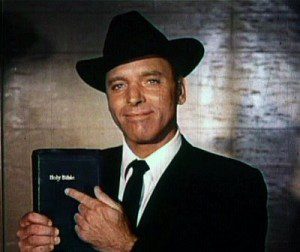John Fea plucks an odd nugget of history out of Molly Worthen’s Apostles of Reason: The Crisis of Authority in American Evangelicalism:
The Resolutions of the National Association of Evangelicals’ Commission on Evangelical Action, organized early in the NAE’s history, give some measure of what “social action” meant to mainstream evangelical leaders in the early 1960s. At the commission’s September 1960 meeting, members discussed the top challenges facing American evangelicals: communism, “the Roman Catholic situation,” IRS pressure on ministers who preached politics from the pulpit, the provision of alcohol to passengers by airlines, and Hollywood’s recent “attacks on evangelical Christianity in such films as Elmer Gantry and Inherit the Wind.
Commies and papists and whiskey, oh my! The culture wars of the early Mad Men years weren’t quite the same as the hot-button issues preoccupying white evangelicals today.
 The alcohol on airplanes bit is probably my favorite, although I’m sure it would also have pleased Sinclair Lewis to learn that he was still bothering the God-botherers nine years after his death and more than three decades after he first published Elmer Gantry.
The alcohol on airplanes bit is probably my favorite, although I’m sure it would also have pleased Sinclair Lewis to learn that he was still bothering the God-botherers nine years after his death and more than three decades after he first published Elmer Gantry.
I understand why the good people of the CEA of the NAE were offended by Gantry. He had their number, I think. Some of his best lines — “Your streets are made unsafe by shameless, diseased hussies, rapacious pick-pockets, and insidious opium-smokers” or “Jesus would’ve made the best All-American quarterback in the history of football!” — might’ve gotten a hearty Amen! from that crowd had they been delivered by someone else.
Still though, when you look at that litany of oddball, archaic “issues” Worthen recites from that 1960 gathering, you can’t help but wonder what these folks had in mind when they worried about the IRS meddling with “ministers who preached politics from the pulpit.” Were they really afraid the government was going to crack down on preachers who inveighed against airline cocktails and Inherit the Wind?
That list seems like evidence that would support the conventional narrative of a white evangelicalism that was mostly a-political and disengaged during the mid-20th century.
But consider this — September 1960, the same month that these white evangelicals were expressing their social concern about “the Roman Catholic situation,” was when Sen. John F. Kennedy delivered his famous speech to the Greater Houston Ministerial Association.
Or, more importantly, consider what’s not included in that list of concerns.
Seven months before these white evangelical men came up with that list, four college freshmen sat down at a Woolworth lunch counter in Greensboro, North Carolina, and politely refused to leave after being denied service. The sit-ins spread throughout the South, gaining momentum, until finally, in late July, Woolworth agreed to integrate its restaurants throughout the country. One restaurant chain had been integrated, but Jim Crow still ruled throughout most of the Bible Belt.
And that didn’t make the NAE’s list of social concerns. I don’t think “a-political” is the right word to describe that.












